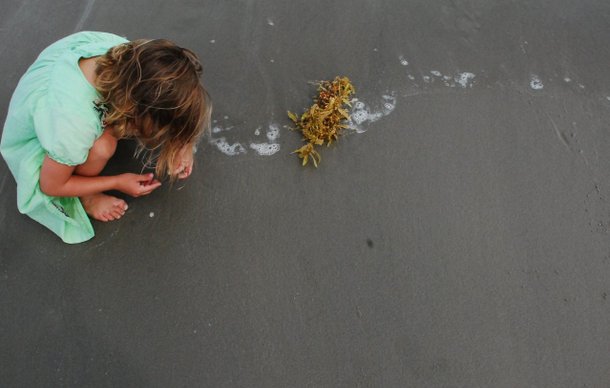As we are still reeling from the recent tragic events in Boston and West, TX, we are reminded that life is fragile, precious, and that we are all beautifully connected. And as I look back on this weekend’s focus on Earth Day, I am again struck by this sense of connectedness and canʼt help but feel a need to send out a distress call of sorts — a call for all people to come together and care for our home with love, respect, and responsibility. Just as events far away effect us wherever we are, so too are we all affected by even one person’s actions for, or against, the Earth.
We see evidence of Global Warming and our Earth in distress all across the globe with headlines of drought, violent weather storm patterns, science fiction-like algae taking over lakes, species of plants and animals becoming extinct or deformed, acidic oceans killing thousands of fish and other aquatic life, and an island of plastic in the Pacific Ocean the size of the state of Texas.
As our precious Earth suffocates under a blanket of Co2, we too are dying a slow death. You simply can not separate the relationship between us, what we do to the Earth, and what we do to our bodies (and worse, to our children’s bodies). We must reverse the pattern that has been set in motion, and each person has to do their part. Through educating ourselves and teaching our children that we are responsible for the health of our world through the daily decisions we make, we can make a difference.
Top offenders against the health of our Earth are: vehicle emissions, trash, plastics, fertilizer, deforestation, coal fired plants, and industrial emissions. So how can we begin to make a difference to offset these enemies of our planet?
- Reduce energy use in your home. Getting everyone in your family involved is the first step. Put a family plan in action to reduce energy use, such as monitoring thermostat settings, turning off lights, unplugging unused devices, and have each family member sign the commitment agreement. Use alternative energy sources such as solar energy or wind energy credits, purchase Energy Star appliances for your home, and install a radiant barrier insulation such as Reflectix to help minimize heating and cooling needs.
- Make smart transportation choices: Vehicle emissions leave one of the largest carbon footprints on Earth. Burning these fossil fuels is not only the greatest polluter of the air we breathe, leading to cancers, asthma, and brain disease, but it is also causing the Earth to be diseased and sickened due to the blanket of carbon covering us. One of the easiest things we can do is to turn off our cars during carpool. We should also try to carpool/ride share or use community transit whenever possible. Make a goal to purchase and drive only high fuel economy vehicles and reduce your driving time by planning out any daily trips and cutting idle driving time. To make an impact beyond your own home, you can petition to stop producing and slowly cut out diesel engines.
- Eliminate fertilizer use. Excess nitrogen (fertilizer) in water and soil kills the life giving oxygen in our air and water. When applied to the yard and/or soil, the nitrogen is heated from the sun and evaporates into a gas into the air, rising up to form a blanket which warms the Earth. The same fertilizer is responsible for the proliferation of algae blooms, as it runs off the land into gutters, alleys, waterways, ponds, rivers, lakes and oceans, strangling the oxygen, killing almost all life except for algae, noxious fish, and jelly fish. Contact your local officials and inquire about what chemicals are applied to parks, fields, and community land. Educate others on the dangers and petition them to stop. Build awareness. Cease all use of all “lawn greening” products wherever you have influence. Oh, and please don’t bag your lawn clippings. Mow over them and nourish the soil naturally. Your yard and the air (no trapped gas) will love you!
- Reduce,Reuse,Recycle… and Ban Plastic: We have all heard of the “3 Rs,” but when the rubber meets the road, do we actually practice them? As usual, having a plan in order is paramount. Reduce the amount of trash you create by evaluating the current trash you have. Devise a plan to at least cut it in half: buy in bulk; reuse glass containers to store foods; reuse bags, clothes, electronics, etc. Donʼt rely on a knee-jerk reaction to “just throw anything away,” instead purpose a place for it. Give belongings you no longer use/need/love a second life through reuse or recycling. And be sure to avoid whenever possible toxic items such as tires, synthetic rubber, PVC, most plastics, and all styrene and Styrofoam. But if you do have them in your possession, be sure to safely dispose of them.
- Make lasting, healthy purchases. Make it a point to only purchase items that will last and not negatively impact the environment. We have a symbiotic relationship with the Earth. For example, if we purchase cheap plastic toys for our children, they are toxic to their little bodies, possibly causing cognitive problems, disease etc… When we toss them, those same throw away, cheap toys end up floating in the ocean or sitting in a land fill poisoning our planet. Buying things made with integrity, out of natural materials, that can be enjoyed for years and then passed on to another person to enjoy, not only helps the planet, but is nourishing to our souls.
We will talk more about trash next week, but for Earth Day, involve your children and educate them on the importance of not littering…ever (even tossing a seemingly innocent piece of chewed gum on the ground). Take them for a visit to a nearby land fill, so they can see and smell first hand that the trash we create does not just “go away.”
One of the best ways to create young eco-crusaders is through positive, meaningful activities that show children they can make an impact.
To that end, Here are a few of my favorite family Earth Day activities:
- Help your children plant a tree and explain how doing so will help clean the air and increase life giving oxygen.
- Create a family plan to reduce trash, reuse, or re-purpose most things. Get kids involved in recycling electronics, batteries, and trash; cutting plastic use dramatically; and turning off, unplugging, and living more energy efficiently.
- As a neighborhood, with your church group, or with a group of friends or family, come together and clean up a heavily polluted or littered area. Make it a regular activity!
- Research with your children images of trash, the oceans, the Pacific trash vortex, and other impact studies to broaden their perspective, gain knowledge, and increase personal responsibility.
We are only as healthy as the home we live in. As stewards, we are called to be care takers of the planet Earth. This Earth Day, letʼs commit to the call to care for our home, everyday. Our future and our childrenʼs childrenʼs future depend on it… Letʼs not let them down.
 Holly Pellham Davis is the founder of Clean Fresh Living, Inc., a service focused on educating consumers and families on the importance of healthy, organic, sustainable living for life and generations to come. You can hear more from Holly on herClean Fresh Living blog, twitter, and Facebook.
Holly Pellham Davis is the founder of Clean Fresh Living, Inc., a service focused on educating consumers and families on the importance of healthy, organic, sustainable living for life and generations to come. You can hear more from Holly on herClean Fresh Living blog, twitter, and Facebook.





